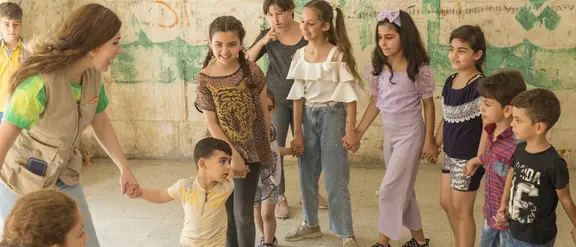Syria: A fresh start in the schools of Aleppo, Latakia and Idlib
Background:
Since the fall of the Assad regime in December 2024, Syria has been in a precarious transitional phase. Years of conflict, displacement, and economic hardship have severely weakened the school system: there is a shortage of teachers, school buildings are destroyed, and many remaining teachers are traumatized or burned out. As a result, around 2.5 million children are unable to attend school. Furthermore, many children suffer particularly severely from the consequences of the long years of war and dictatorship: many have physical disabilities or psychological trauma that require special attention and specialized teacher training in the daily school routine.
Project Goal:
In Aleppo, Latakia, and Idlib – three war-torn regions of Syria – this project supports six schools and 120 teachers in creating safe, inclusive, and vibrant learning environments. The focus is on the children's self-confidence: regardless of their origin, identity, or physical limitations, they should learn to thrive again – and one day rebuild their communities.
Partners and Coordination:
The program is led by our sister organization Terre des Hommes Italy, which has been active in Syria since 2006. Together with the newly formed Syrian Ministry of Education and local education experts, the partners develop practical solutions: They assess needs on the ground, support schools, and integrate international expertise into everyday school life.
What's happening on the ground
Empowering Teachers: Practical Training and Learning Groups
. Around 120 teachers at six schools are participating in four training modules. These modules cover inclusive methods, active learning formats, dealing with the effects of trauma, and structured lesson planning. The modules are practically oriented: teachers try out new approaches directly in the classroom, develop action plans, and meet regularly in moderated learning groups to exchange ideas. Mentors provide individual support.
School committees: Bringing decisions to the school.
At every school, teacher-led committees are formed to identify local needs, plan measures – from inclusive learning materials to tutoring – and learn to manage and evaluate their projects. Smaller projects are supported by the project team to ensure that improvements are sustainable.
Strengthening community cohesion: Activities for the entire community,
such as project days, class discussions, and events, bring students, parents, and neighbors together. Young people are actively involved in the planning to break down prejudices, build trust, and amplify their voices.
A guide to inclusive education:
In collaboration with the Ministry of Education, a practical guide to the inclusion of children with disabilities is being developed, including teaching examples, everyday tips, and recommendations for schools. Workshops ensure that the guide is adapted to local realities and becomes politically viable.
Sustainable impact:
The project combines political advocacy with concrete support in schools. This aims to keep teachers connected, empower schools to take their own initiatives, and provide the Ministry of Education with tools to strengthen inclusive education in the long term.
Project duration
15.08.2025 – 14.02.2027
